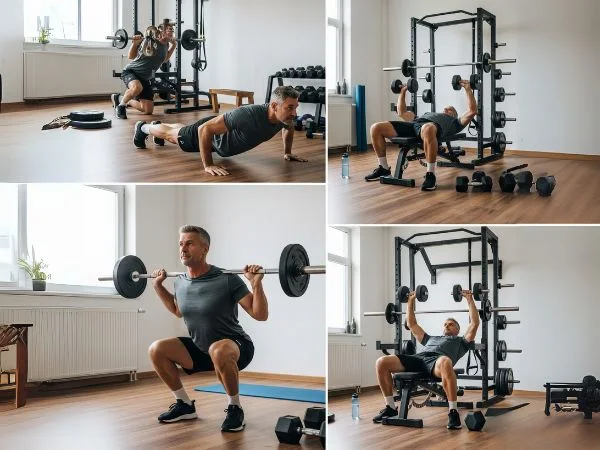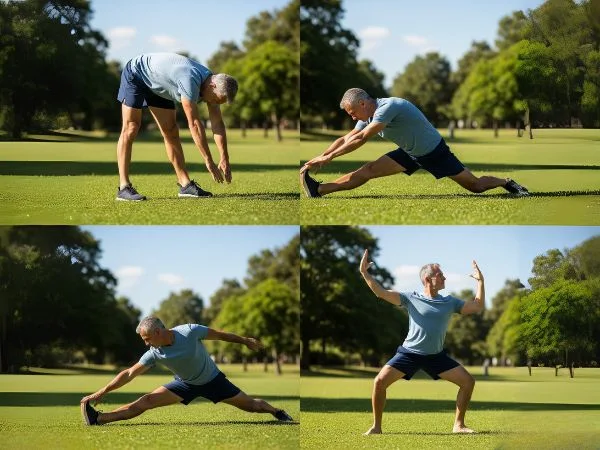Reaching your 50s is a milestone and your fitness should reflect that. At this age, workouts aren’t about chasing records in the gym. Instead, they’re about staying strong, protecting your joints, and keeping your energy up for everyday life.
We’ve worked with countless men over 50, and we know the right fitness plan makes all the difference.
In this guide, we’ll show you a step-by-step workout routine for men over 50. You’ll learn how to combine strength, cardio, flexibility, and recovery so you can move better, feel younger, and stay healthy for years ahead.

What You’ll Learn
Why Fitness After 50 Matters
As we age, the body changes. Here’s what happens after 50:
- Metabolism slows making weight management harder.
- Muscle loss (sarcopenia) becomes more noticeable.
- Joint wear and tear can lead to stiffness or discomfort.
However, don’t worry; the right workouts can help slow and even reverse these effects. Regular exercise helps:
- Boost energy and stamina.
- Improve heart health and blood pressure.
- Maintain strength and balance.
- Support mobility to make daily movement feel easier.
Workouts for men over 50 aren’t about doing less; they’re about doing smarter, safer, and more effective training than you did at 30.

Key Principles of a Workout Routine for Men Over 50
Before we dive into the plan, keep these golden rules in mind:
- Protect your joints by choosing exercises that are smooth and low-impact.
- Balance is key: mix strength, cardio, and flexibility work.
- Consistency beats intensity: 30–45 minutes a few times per week works better than rare, extreme workouts.
- Listen to your body: if something hurts, adjust. Always check with your doctor before starting a new routine.
Best Workout Routine for Men Over 50

1. Strength Training (2–3 Days Per Week)
Strength training is essential for preserving muscle and bone health. We recommend focusing on compound movements that train multiple muscle groups:
- Squats or chair-assisted squats.
- Push-ups (modified on knees or wall if needed).
- Dumbbell rows or resistance band rows.
- Chest press (machine or dumbbells).

2. Cardio & Heart Health (3 Days Per Week)
Cardio keeps your heart, lungs, and energy systems in top shape. Low-impact activities are best:
- Brisk walking outdoors or on a treadmill.
- Cycling or stationary bike.
- Swimming or water aerobics.
- Elliptical trainer.

3. Flexibility & Mobility (Daily or 3/4x Per Week)
Stiffness and tightness increase with age, but mobility work helps keep your body moving freely.
- Stretch hamstrings, hips, and shoulders daily.
- Try yoga or tai chi for flexibility and balance.
- Use foam rollers to ease tight muscles.

4. Core & Balance Work (2–3 Days Per Week)
Core strength is the foundation for all movement. It also reduces fall risk a key concern after 50.
- Planks (hold for 10–30 seconds).
- Bird dogs (opposite arm/leg extensions).
- Side bridges or side planks.
- Stability ball crunches.
Weekly Workout Plan for Men Over 50
Here’s a simple, balanced 7-day plan designed for men over 50. It combines strength, cardio, flexibility, and recovery, the four pillars of long-term fitness.
Day 1: Strength + Core
Goal: Build muscle and support metabolism.
- Do full-body strength training: squats, push-ups (modified if needed), dumbbell rows, shoulder presses.
- Add core exercises: planks, bird dogs, side planks.
- Focus on 2–3 sets of 8–12 reps with good form.
Why? Strength training slows muscle loss (sarcopenia), keeps bones strong, and helps with balance and independence. Core work supports your spine and prevents back pain.
Day 2: Cardio + Stretching
Goal: Boost heart health and flexibility.
- Choose low-impact cardio for 20–40 minutes (brisk walking, cycling, swimming).
- Finish with 10–15 minutes of stretching (hamstrings, hips, chest, shoulders).
Why? Cardio lowers blood pressure, supports weight control, and strengthens the heart. Stretching keeps joints mobile and reduces stiffness.
Day 3: Strength + Balance
Goal: Maintain strength while training stability.
- Repeat a strength session, but mix in balance drills: single-leg stands, step-ups, stability ball exercises.
- Keep the workout 30-40 minutes, moderate effort.
Why? Balance work lowers fall risk, one of the biggest concerns after 50. Combined with strength, it helps you move safely in daily life.
Day 4: Rest or Light Walking
Goal: Recovery without losing momentum.
- Take a rest day or engage in light activities like walking, stretching, or mobility exercises.
- Focus on hydration, good meals, and sleep.
Why? Recovery allows muscles to repair and grow. Light walking boosts circulation without strain.
Day 5: Cardio + Core
Goal: Strengthen the heart and protect the midsection.
- 20–30 minutes of cardio (walk, bike, elliptical).
- Core session: planks, seated knee lifts, Russian twists (light weight or no weight).
Why? Core stability helps maintain posture and balance, while cardio helps regulate your energy and heart health.
Day 6: Strength + Mobility
Goal: Build strength while improving joint function.
- Focus on resistance training (use dumbbells, bands, or machines).
- Conclude with mobility drills, including shoulder circles, hip openers, and foam rolling.
Why? Mobility training helps keep your body flexible, allowing you to lift safely and move without pain.
Day 7: Rest or Gentle Yoga
Goal: Recharge physically and mentally.
- Take a full rest day OR practice gentle yoga or tai chi.
- Focus on breathing, stretching, and relaxation.
Why? Rest lowers stress hormones, improves recovery, and keeps workouts sustainable long-term. Yoga also improves flexibility, balance, and mental clarity.
Weekly Training Goals Recap:
- 3 strength sessions (Days 1, 3, 6).
- 3 cardio sessions (Days 2, 5, plus walking on Day 4 if you like).
- Daily mobility/flexibility work (5–10 minutes is enough).
- At least 1 full rest day to recover.
This balance helps men over 50 maintain muscle, protect heart health, improve flexibility, and recover properly all without overtraining.
Free Workout Plans for Men Over 50
To make this easier, we recommend using a structured plan. Many men find it helpful to follow a downloadable PDF workout guide that outlines exercises, sets, and reps. Look for plans that are:
- Home-friendly (bodyweight and dumbbell options).
- Joint-friendly (low-impact cardio, safe lifting).
- Clear and progressive (start light, increase slowly).
Nutrition & Recovery Tips for Men Over 50
Exercise works best when paired with a balanced diet and adequate recovery. Here’s what we advise:
- Protein first: aim for 20–30g of protein per meal to keep muscle.
- Eat anti-inflammatory foods, such as berries, nuts, olive oil, and leafy greens.
- Hydrate daily: water supports joint health, digestion, and overall energy levels.
- Prioritize sleep: aim for 7–8 hours of sleep per night for optimal recovery and hormone balance.
Common Mistakes to Avoid
- Overtraining without enough rest days.
- Following routines designed for much younger men.
- Ignoring flexibility and mobility training.
- Skipping warm-ups or stretching.
Read more about benefits of dedicated space for home workout routine.
Final Thoughts
The truth is simple: it’s never too late to get fit. Whether you’re starting fresh or returning after years away, the right workout routine for men over 50 will help you stay strong, lean, and confident.
Remember progress comes from consistency, not intensity. Stick with it, adjust when needed, and focus on building a lifestyle you can maintain long term. Your 50s and beyond can be some of your healthiest years yet.
FAQs
1. What’s the best workout routine for men over 50 at home?
At home gym workout are bodyweight moves (push-ups, squats, planks) with resistance bands or dumbbells.
2. How many days a week should men over 50 work out?
Aim for 4–5 active days with at least 2 rest/recovery days.
3. Can men over 50 still build muscle?
Yes. Strength training + enough protein still works at this age.
4. What is a safe cardio workout for men over 50?
Walking, swimming, and cycling are all joint-friendly options.
5. Is weightlifting safe for men over 50?
Yes, as long as you use proper form, moderate loads, and progress gradually.